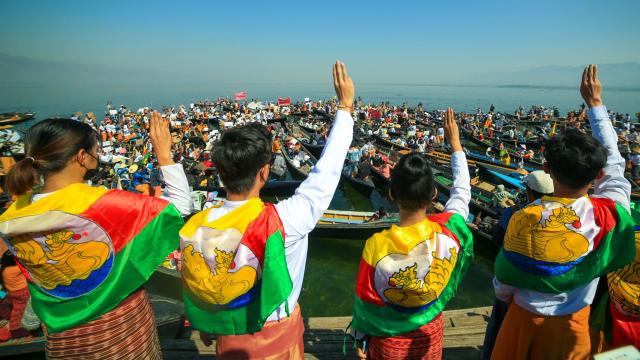Facebook has pledged to restrict the widespread distribution of content from Myanmar’s military regime following a successful coup that toppled the democratically elected government on Feb. 1. The pledge comes from a new blog post at Facebook’s website that seems to implicitly acknowledge the potential for authoritarians to use the social media platform in horrendous ways.
“Facebook is treating the situation in Myanmar as an emergency. Our Integrity Operations Centre has been running around the clock since the coup began,” Rafael Frankel, the director of policy for Facebook’s Asia-Pacific team, wrote late Thursday.
“It brings together subject matter experts from across the company, including Myanmar nationals with native language skills, so we can monitor and respond to any threats in real time,” Frankel continued.
Frankel explained that the Myanmar military, known as Tatmadaw, had been spreading misinformation since the coup and Facebook would be dramatically reducing the spread of that content, while not banning it altogether.
From the Facebook announcement:
In line with our global policies on repeat offenders of misinformation, we will also no longer be recommending them to people. Among other military-run accounts, these measures apply to the Tatmadaw Information Team’s Facebook Page and to Tatmadaw spokesperson Brigadier-General Zaw Min Tun’s Facebook account. This same action will be applied to any additional pages that the military controls that repeatedly violate our misinformation policies.
We have also indefinitely suspended the ability for Myanmar government agencies to send content removal requests to Facebook through our normal channels reserved for authorities around the world.
Frankel also pledged to protect the political speech of activists, journalists, and ordinary people in Myanmar, something that could be difficult to maintain given the current government’s hostility to an open web. Facebook also said it would help anyone in Myanmar “who reasonably fears detention” to “secure their Facebook accounts and data from unauthorised access.” The company didn’t immediately explain how it planned to do that, though presumably it would entail simply not handing over information to the government that Facebook has on people and organisations.
Facebook took a lot of heat back in 2018 for at least partially enabling the genocide of Rohingya Muslims that was being perpetrated by the same military that now controls the country. If there’s any silver lining in all of this it’s that the social media giant has hopefully learned how to better control the spigots of hate and misinformation on its platform to minimise the damage in Myanmar.
But it all raises the obvious question of why Facebook would have to do anything special during an emergency situation like this. If misinformation and hate speech is a problem, why not take care of that during normal times as well? It seems to be an eternal question for companies like Twitter, Facebook, and YouTube. But we may never get a straight answer.
